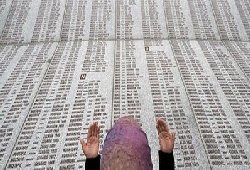Survivors of the 1995 Srebrenica massacre said on Wednesday that a Serbian parliament resolution condemning the crime was meaningless since it failed to label it as genocide.
"For us it really means nothing" since it fails to mention the term genocide, Hajra Catic, head of an association of Srebrenica survivors, told AFP.
Some 8,000 Bosnian Muslims were killed in a bloodbath considered the worst single atrocity on European soil since World War II. The killings were deemed to constitute a genocide by two international courts.
"They should have not adopted it at all," Catic, whose husband and a son were among Muslim men and boys killed in the eastern town, added.
"We know that the crimes have been committed in all Bosnia but we do have a ruling of the International Court of Justice which says that in Srebrenica a genocide has been committed," concluded Catic, head of Women of Srebrenica, based in the eastern town of Tuzla.
The Serbian parliament early Wednesday passed a landmark resolution condemning the massacre, in a move ending years of denial by Serbian politicians about the scale of the killings.
"The parliament of Serbia strongly condemns the crime committed against the Bosnian Muslim population of Srebrenica in July 1995, as determined by the International Court of Justice (ICJ) ruling," the text says.
The lawmakers also formally extended "their condolences and an apology to the families of the victims because not everything possible was done to prevent the tragedy."
The massacre is the only episode in Bosnia's 1992-1995 war to have been ruled as genocide by the international courts -- the International Criminal Tribunal for the former Yugoslavia (ICTY) and the ICJ, both based in The Hague.
After capturing the UN-protected enclave, Bosnian Serb troops summarily executed some 8,000 Muslim men and boys and buried the bodies in various mass graves.
Bosnia's war claimed some 100,000 lives.
PHOTO CAPTION
A Bosnian Muslim woman prays at the memorial wall with the names of the victims at the Potocari Memorial Center near Srebrenica in 2008.
AFP


 Home
Home Discover Islam
Discover Islam Quran Recitations
Quran Recitations Lectures
Lectures
 Fatwa
Fatwa Articles
Articles Fiqh
Fiqh E-Books
E-Books Boys & Girls
Boys & Girls  Ramadan
Ramadan Fatwa Audios
Fatwa Audios Month of Mercy
Month of Mercy Women
Women Eed Al- Fitr
Eed Al- Fitr Food Recipes
Food Recipes Videos
Videos

 Prayer Times
Prayer Times












